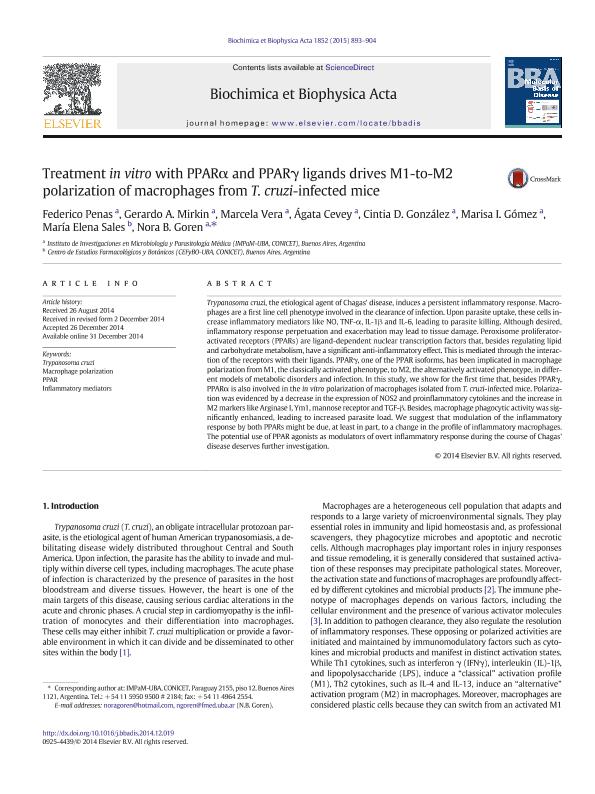Artículo
Treatment in vitro with PPARα and PPARγ ligands drives M1-to-M2 polarization of macrophages from T. cruzi-infected mice
Penas, Federico Nicolás ; Mirkin, Gerardo A.; Vera, Marcela; Cevey, Ágata Carolina
; Mirkin, Gerardo A.; Vera, Marcela; Cevey, Ágata Carolina ; Gonzalez, Cintia Daniela
; Gonzalez, Cintia Daniela ; Gomez, Marisa Ines
; Gomez, Marisa Ines ; Sales, Maria Elena
; Sales, Maria Elena ; Goren, Nora Beatriz
; Goren, Nora Beatriz
 ; Mirkin, Gerardo A.; Vera, Marcela; Cevey, Ágata Carolina
; Mirkin, Gerardo A.; Vera, Marcela; Cevey, Ágata Carolina ; Gonzalez, Cintia Daniela
; Gonzalez, Cintia Daniela ; Gomez, Marisa Ines
; Gomez, Marisa Ines ; Sales, Maria Elena
; Sales, Maria Elena ; Goren, Nora Beatriz
; Goren, Nora Beatriz
Fecha de publicación:
12/2014
Editorial:
Elsevier Science
Revista:
Biochimica et Biophysica Acta - Molecular Basis of Disease
ISSN:
0925-4439
Idioma:
Inglés
Tipo de recurso:
Artículo publicado
Clasificación temática:
Resumen
Trypanosoma cruzi, the etiological agent of Chagas' disease, induces a persistent inflammatory response. Macrophages are a first line cell phenotype involved in the clearance of infection. Upon parasite uptake, these cells increase inflammatory mediators like NO, TNF-α, IL-1β and IL-6, leading to parasite killing. Although desired, inflammatory response perpetuation and exacerbation may lead to tissue damage. Peroxisome proliferator-activated receptors (PPARs) are ligand-dependent nuclear transcription factors that, besides regulating lipid and carbohydrate metabolism, have a significant anti-inflammatory effect. This is mediated through the interaction of the receptors with their ligands. PPARγ, one of the PPAR isoforms, has been implicated in macrophage polarization from M1, the classically activated phenotype, to M2, the alternatively activated phenotype, in different models of metabolic disorders and infection. In this study, we show for the first time that, besides PPARγ, PPARα is also involved in the in vitro polarization of macrophages isolated from T. cruzi-infected mice. Polarization was evidenced by a decrease in the expression of NOS2 and proinflammatory cytokines and the increase in M2 markers like Arginase I, Ym1, mannose receptor and TGF-β. Besides, macrophage phagocytic activity was significantly enhanced, leading to increased parasite load. We suggest that modulation of the inflammatory response by both PPARs might be due, at least in part, to a change in the profile of inflammatory macrophages. The potential use of PPAR agonists as modulators of overt inflammatory response during the course of Chagas' disease deserves further investigation.
Palabras clave:
Tripanosoma Cruzi
,
Macrophage Polarization
,
Ppar
,
Inflammatory Mediators
Archivos asociados
Licencia
Identificadores
Colecciones
Articulos(CEFYBO)
Articulos de CENTRO DE ESTUDIOS FARMACOLOGICOS Y BOTANICOS
Articulos de CENTRO DE ESTUDIOS FARMACOLOGICOS Y BOTANICOS
Citación
Penas, Federico Nicolás; Mirkin, Gerardo A.; Vera, Marcela; Cevey, Ágata Carolina; Gonzalez, Cintia Daniela; et al.; Treatment in vitro with PPARα and PPARγ ligands drives M1-to-M2 polarization of macrophages from T. cruzi-infected mice; Elsevier Science; Biochimica et Biophysica Acta - Molecular Basis of Disease; 1852; 5; 12-2014; 893-904
Compartir
Altmétricas



